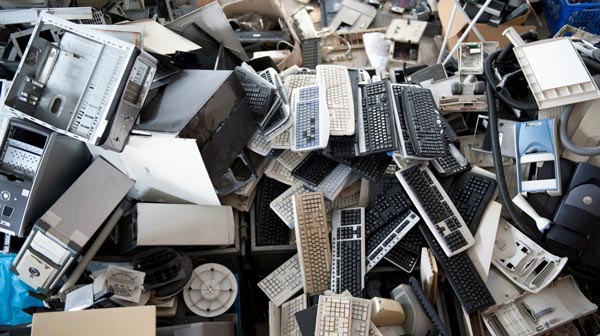R2 Certification Electronic Devices Recycling: Your Assurance for Accountable Disposal
R2 Certification Electronic Devices Recycling: Your Assurance for Accountable Disposal
Blog Article
Elevate Your E-Waste Management With R2 Accreditation: a Thorough Summary
One secret approach to elevate e-waste monitoring methods is by achieving R2 accreditation. By exploring the processes and advantages associated with R2 qualification, a deeper understanding of just how it can reinvent e-waste monitoring approaches arises, losing light on a course in the direction of sustainability and ethical disposal practices.
Significance of E-Waste Management

When e-waste is not managed properly, these toxic materials can seep into the environment, causing damage to wildlife and possibly entering the food web, positioning risks to human health and wellness. The incorrect disposal of e-waste contributes to air pollution and greenhouse gas exhausts, aggravating environment change and ecological destruction.

Benefits of R2 Accreditation

To start with, R2 accreditation enhances credibility by showcasing an organization's dedication to sustainable methods. It ensures consumers, partners, and stakeholders that the business sticks to stringent standards for e-waste management - r2 certification. This trustworthiness can result in increased trust and improved relationships with clients that prioritize environmental obligation
Secondly, R2 accreditation helps alleviate risks connected with inappropriate e-waste disposal. By complying with the strict guidelines established forth by the qualification, organizations can minimize the possibility of data violations, environmental contamination, and lawful consequences. This proactive approach safeguards the company's online reputation and decreases potential responsibilities.
Finally, R2 accreditation demonstrates a dedication to ecological stewardship - r2 certification. By properly managing digital waste with licensed procedures, companies contribute to the conservation of sources, decrease of air pollution, and promo of a circular economic climate. This dedication not only benefits the atmosphere however likewise aligns with advancing customer assumptions for sustainable company methods
R2 Accreditation Refine Review
Having established the benefits of R2 certification in promoting integrity, danger mitigation, and ecological stewardship, it is important to now detail the detailed procedure associated with getting this qualification. The R2 accreditation process starts with an extensive testimonial of the company's operational policies and treatments to make certain compliance with the R2 requirement. This first assessment is essential in identifying any type of gaps that require to be addressed prior to continuing better.
Once the company's methods line up with the R2 standard needs, an independent third-party auditor carries out an on-site audit to examine the application and performance of these practices. This audit consists of an extensive review of documentation, interviews with team, and physical examinations of centers to confirm compliance.
Complying with an Read Full Report effective audit, the organization obtains a qualification choice based upon the auditor's findings. If authorized, the organization is granted R2 accreditation, demonstrating its dedication to responsible e-waste administration. It is necessary to note that maintaining R2 qualification needs recurring compliance with the criterion's requirements and periodic audits to make certain ongoing adherence to best practices in e-waste recycling and disposal.
Key Requirements for R2 Conformity
An essential element of achieving R2 compliance is guaranteeing that all digital waste (e-waste) handling facilities meet strict environmental and safety and security criteria. To adhere to R2 demands, organizations have to abide by crucial requirements that focus on liable e-waste management techniques. These standards consist of implementing a documented ecological, wellness, and Bonuses security administration system, making sure the secure handling of data-containing devices, and carrying out thorough downstream due diligence to track the last location of e-waste products.
Moreover, R2 compliance requires the correct screening, repair, and recycling of digital tools to expand its beneficial life and lessen environmental effect. Facilities seeking R2 certification must also focus on employee health and wellness by providing necessary training, personal safety equipment, and a risk-free functioning setting. In addition, maintaining in-depth documents of e-waste handling tasks and frequently undergoing audits by accredited accrediting bodies are important parts of demonstrating ongoing conformity with R2 standards.
Influences of Lasting E-Waste Practices
The application of sustainable e-waste methods according to R2 compliance not only ensures ecological and safety criteria are fulfilled but also dramatically influences the overall lifecycle of electronic products. By adhering to R2 criteria, digital waste monitoring procedures become extra effective, decreasing the environmental footprint of electronic items. Lasting e-waste practices help with the appropriate disposal of electronic components, making certain that harmful products are managed properly and do not end up contaminating the atmosphere.
Additionally, sustainable e-waste practices can add to work creation in the recycling and refurbishment markets, fostering economic development while promoting environmental obligation. Generally, visit this website the fostering of sustainable e-waste techniques under R2 certification offers as a crucial action towards achieving a much more ecologically lasting electronic devices sector.
Conclusion
In conclusion, carrying out appropriate e-waste management techniques is important for ecological sustainability and source conservation. R2 qualification plays a key function in making sure liable handling and disposal of electronic waste. By sticking to the rigid criteria established forth by R2 requirements, organizations can not just minimize their ecological influence but also contribute to a more sustainable future for generations ahead.
One key method to boost e-waste administration methods is by obtaining R2 certification. By exploring the benefits and procedures associated with R2 accreditation, a deeper understanding of how it can reinvent e-waste monitoring approaches emerges, losing light on a path in the direction of sustainability and ethical disposal techniques.
The R2 accreditation process starts with a detailed review of the organization's functional plans and procedures to make certain compliance with the R2 standard. If accepted, the company is granted R2 accreditation, demonstrating its commitment to responsible e-waste management. Overall, the fostering of sustainable e-waste methods under R2 accreditation offers as a crucial action in the direction of achieving an extra environmentally sustainable electronics market.
Report this page